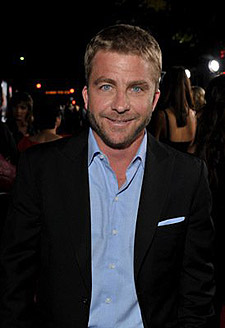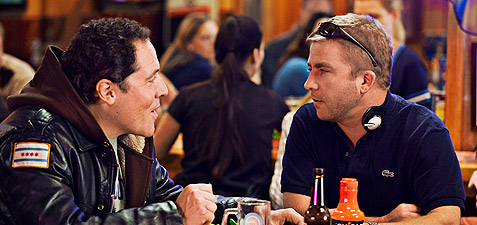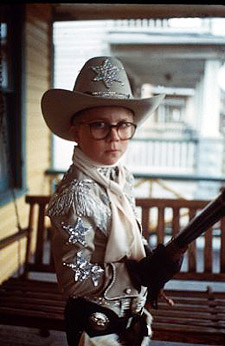
Interview Date: 02/03/2010
Run Date: 02/08/2010
Interviews Home / Movies Home / Bullz-Eye Home
If you look at Peter Billingsley, director of “Couples Retreat,” it’s highly possible that you may find yourself wondering why he looks so familiar, even though you can’t quite place the face. Try adding a pair of glasses, however, and it’ll come to you. Although Billingsley carved out quite a nice career for himself in his years as a child actor through his work in commercials (that’s right: he was Messy Marvin) and movies (yep: he was also Ralphie in “A Christmas Story”), it was his work on television series and specials that had far more to do with finding himself a role behind the scenes lo these many years later. Bullz-Eye talked with Billingsley about the experience of helming “Couples Retreat,” a film which starred both a guy he worked with on a “Little House on the Prairie” episode and a dude he shared a locker room with for a CBS Schoolbreak Special entitled “The Fourth Man.” Who were these gentlemen? If you don’t already know, you’ll find out soon enough.
Peter Billingsley: Hello, Will!
Bullz-Eye: Hello, Peter! How are you?
PB: I’m doing great!
BE: Well, first of all, I’m a strong believer in the theory that no film that begins with David Bowie’s “Modern Love” can be but so bad, so thanks for keeping that intact for me.
PB: (Laughs) Good theory. I like it!
BE: When it comes to putting together an ensemble comedy, it’s a real gamble, because you’ve got to kind of blend bankable names with actor chemistry. How hard or easy was it to pull this one together?
PB: Well, the journey started with an original idea of Vince (Vaughn’s), and, really, he already had the four guys in mind: himself, (Jason) Bateman, Faizon (Love), and (Jon) Favreau. Once the script was done, we really began the casting process for rounding out the girls. What I like about these girls is that they’re not sketch performers. They’re real actors, and they’ve done real performances in a lot of films. Then, I think, because so much of the comedy is relatable and comes from grounded things, if you just allow them to play the intention of something that’s meaningful and the situation is funny, a lot of the comedy can grow out of that. There was just a lot of innate chemistry that existed between the guys, and we spent some time together as the couples as well, and I think that chemistry’s apparent with all of the couples onscreen.
BE: I enjoyed the movie, but if I’m honest, I think my favorite part is actually the first twenty minutes or so, where the kids are still in the picture. It plays a lot like “Parenthood” to me.
PB: It does, and it’s very real stuff. These are very regular folks, dealing with all the regular things of work and school and kids and fidelity and infidelity and all the problems that a lot of couples and real-life people actually face, so it’s a good starting place for the movie. It’s one of the things that I really liked most about it, and what Vince had originally thought was, “Let’s start them in a super, super grounded place that’s relatable.” You have the four archetypical problems that couples go through, so in some ways, yes, it’s four different couples, but in other ways, it’s one four-headed monster, four problems that a lot of people have to deal with. One of the nice things in the feedback for the movie is that a lot of people can relate to these peoples.
BE: As a director, how was it walking the tightrope of comedy and drama? Because it wasn’t necessarily heavy drama, but there were certainly dramatic moments.
PB: Yeah. Well, again, if you start the movie in a place where it’s real people dealing with real life things, I think there’s a responsibility to continue to adhere to those things. There’s a couple that’s contemplating separating, and that’s as big a decision as a couple might make in their life, so I don’t think it’s reasonable or fair to not honor that later. That’s one of the things that I like a lot about the movie: it retains those stakes. I think you walk that line easily by just saying, “Listen, let’s play the reality of the moment. Here it’s funny, but here there’s something real going on, and let’s not be afraid to honor that.” I think sometimes comedies just want to get their way through, or they’re afraid to get a little bit real, and I think people and audiences appreciate it when you follow the trajectory a little more toward what the character would actually be feeling.
BE: Well, playing off of that, did people approach you and say, “Y’know, I actually liked it better when it was less silly and more serious”?
 PB: Yeah, and I think people have different preferences, but it’s a good blend, I think, of comedy and what you’d really be going through. Like I said earlier, the word for me is “stakes.” If you really honor the stakes, that these are folks who want to change and really want to grow…sometimes people don’t have all the skills or the tools to know how to do that, so it’s meaningful to them, but it’s frustrating because it’s hard to change, and it’s sometimes hard to grow. That’s the fun journey of it. They’re put into situations that are grounded in reality, but…there’s kind of a commitment to the absurd. Like yoga, for example. Everyone’s either heard of yoga, been around yoga, or even been in a yoga class, and a lot of us have dealt with the inappropriate yoga guy, for sure, but this is an extreme version of that. (Laughs) That’s what makes it funny, but at its core, there’s something real, because maybe you’ve seen a yoga instructor looking at your girl or helping her a little too much into a pose. So it comes from somewhere truthful.
PB: Yeah, and I think people have different preferences, but it’s a good blend, I think, of comedy and what you’d really be going through. Like I said earlier, the word for me is “stakes.” If you really honor the stakes, that these are folks who want to change and really want to grow…sometimes people don’t have all the skills or the tools to know how to do that, so it’s meaningful to them, but it’s frustrating because it’s hard to change, and it’s sometimes hard to grow. That’s the fun journey of it. They’re put into situations that are grounded in reality, but…there’s kind of a commitment to the absurd. Like yoga, for example. Everyone’s either heard of yoga, been around yoga, or even been in a yoga class, and a lot of us have dealt with the inappropriate yoga guy, for sure, but this is an extreme version of that. (Laughs) That’s what makes it funny, but at its core, there’s something real, because maybe you’ve seen a yoga instructor looking at your girl or helping her a little too much into a pose. So it comes from somewhere truthful.
BE: You had a couple of great ad-libbers serving as therapists in the film. As much as I respect the screenwriters, please tell me that Ken Jeong’s line about “puppy cradle death syndrome” was something that came out of his head.
PB: Yes. (Laughs) Vince is pretty funny, and a lot of time he’ll feed stuff, and…well, we always shoot what’s on the page, and we shoot two ways, generally. In a situation like that, you’ve got one camera on Ken and you’ve got a reverse camera on the couple, so that if something comes up, you get their reaction or his life. After we’ve gotten everything that’s scripted, as you’ll see in the therapy outtakes on the DVD, we try a lot of different stuff…and that was definitely an improv.
BE: This was one of the first films shot in Bora Bora in quite some time, and I know it wasn’t the only location under consideration. Was it a long, rigorous case situation of you traveling to gorgeous, sun-drenched places for research?
PB: Yes, let me tell you, I milked that as long as I could. I kept calling back to the studio and saying, “I’m sorry, guys, but this tropical paradise isn’t going to work, either. I’ve got to get back on a plane.” And then they quickly realized and stopped me and said, “Look, you’ve got to make a decision now.” (Laughs) No, we really looked around and looked at a lot of photos, but what’s exceptional about Bora Bora is that it’s not instantly geographically recognizable to something. Meaning, it doesn’t only appear to be Polynesian or Hawaiian. It’s kind of like “Fantasy Island,” in a way, you know? “Where was that?” “Well, it’s Hawaii.” “Yeah, but they had white suits…” It’s, like, you didn’t quite know where it was, but you just knew it was beautiful and you wanted to be there. That’s what we wanted Eden to be: representative of something more than a specific locale. Really, with that water and the sand and the trees, it just was one of the most beautiful places that I had ever seen, and I was so thrilled that the studio was supportive of going there, because it’s in the middle of nowhere.
BE: I mentioned Bowie a minute ago, but the choice of Billy Squier’s “Lonely is the Night” for the epic “Guitar Hero” battle was inspired.
PB: Yeah, y’know, that’s…it’s kind of nice. I hope people get to rediscover that song again. That “Guitar Hero” really stems from that fun, primal place that exists within all of us, that we do want to be rock stars, and the fact that Stanley takes it to that absurd level and probably beats everyone on the island is kind of living out a fantasy that maybe many of us have kind of asked for. We’d like to be on stage, but maybe all of us can’t be. So “Lonely is the Night” is…it’s kind of the combination of cool rock and guts, but it’s also kind of a fun sing-along song.
BE: Was it your pick?
PB: No, it was Vince’s pick.
BE: You know, I listened to the audio commentary, and I’d forgotten that you and Jason Bateman had done a “Little House on the Prairie” together
PB: Yes, we had.
BE: So did you guys really stay in touch after that, or did you just kind of casually follow each other’s careers out of the corner of your eye?
PB: We had! We would keep in touch, and we would see other around at things, so even though I’ve been friends with Vince for, like, twenty years, Jason I’ve known for even longer. It’s been nice to see him. We joke about how we’ve both been in the business for something like 35 years, so we’re the crusty veterans on the set. (Laughs)
BE: And you met Vince when you two worked together on the CBS Schoolbreak Special, “The Fourth Man.”
PB: Yes, that’s right.
BE: Was that a case where all the guys were screwing around on set, and before you knew it, you’d formed a bond?
PB: Yeah, you know, I was kind of finishing up my acting career, and he was just starting his, so we had just met on that and became good friends off-screen. You know, we just wanted the same stuff, liked the same sports, and we just kept in touch and hung out a lot. And then he did “Swingers” with Favreau, and I was starting my transition through post-production and writing and directing and doing a lot of that. When “Made,” a film which…well, it wasn’t really a follow-up to “Swingers,” but it was another collaboration between those two, and when it came up, Vince asked me to come on and produce it. It was a sort of a smaller-budgeted, negative pickup for Artisan, and that really started us working together behind the scenes. Now, we’ve done a whole mess of films together.

BE: You also worked with Favreau on “Dinner for Five.” I was wondering what your favorite tableful was that you witnessed.
PB: Boy, that’s a good question. We did 50 episodes. That was a fun show. (Considers the question) I had worked with Burt Reynolds years ago on a film called “Paternity” when I was nine, and he came on and did our show. He’s one heck of a storyteller, and, boy, has he been through a lot of generations, and when you think back, he really kind of had a hit in every one of those generations. So it was really fun to hear him tell stories. He did it with…I think it was Richard Lewis, Kevin James, and Tony Shaloub. That was a pretty great table.
BE: As a fan of Daniel Pinkwater’s books growing up, I have to tell you that I have fond memories of your work in “The Hoboken Chicken Emergency.”
PB: Omigod, you’re pulling that one out? Wow. I haven’t heard that one in a long time! (Laughs) Yes, that was…well, you know, you audition for stuff, and you get some stuff, and that was one that I had gotten. It was about…I think I was sent to buy a Thanksgiving turkey, and I got railroaded and wound up buying a seven-foot chicken and brought it home. It was named Henrietta, if I remember correctly.
BE: You are correct, sir.
PB: That was for PBS. It was a fun television movie. I honestly haven’t heard much about it since we did it…not until you just brought it up. (Laughs) It was a lot of fun, though.
BE: Somewhere around here, I actually still have my original copy of the book.
PB: Really? That’s pretty cool!
BE: And, you know, title-wise, as far as your projects go, I feel like it’s right up there with “Massarati and the Brain.”
PB: Yeah, which was another gem. (Laughs) That was really a pilot for a television series. Massarati was the slick private eye, and I was The Brain, his sidekick, who could figure out anything, make bugs, try to decode any sort of a message, that kind of thing. Obviously, that onscreen chemistry didn’t lead to one of the great Hollywood duos… (Laughs) …but it was a lot of fun. That was Aaron Spelling. He was smart: he would do a lot of pilots, but he’d shoot a little extra footage, and if they didn’t work, he’d just air them as a movie. People don’t do that anymore.
BE: I know we’re coming up against the wall, so I’ve just got three quick ones to wrap it up.
PB: Sure!
BE: First of all, as someone who endured being called Messy Marvin through many years of school, I’m just curious how much Hershey’s Syrup you ended up pulling in from that gig.
PB: You know, they were very kind. They would send me boxes of chocolate every year. I was on that short list of special clients, and every Christmas we’d get a big box full of Hershey’s candy. Hershey’s was great. I really enjoyed that. I was seven or eight or something like that, and I was hired originally as what’s called a back-up. When you hire kids, you hire your primary, but, y’know, kids are young… (Laughs) …so just in case, you also hire a back-up, and for whatever reason, the one who was hired just didn’t work. I’d been there for, like, eleven hours and was ready to go, and then they brought me in and did it, and that wound up being something like eight or nine commercials and a decade-long thing. You never know where that stuff’s really going to come from.
BE: When they air a 24-hour “A Christmas Story” marathon, how many hours do you yourself end up watching, if at all?
 PB: I do watch. It generally winds up on television in the house for a little bit. Some folks in my family still enjoy that movie very much… (Laughs) …and I do, too. So, you know, we watch some little snippets here and there, and then we’ll switch to any potential sporting events which may be on, so of the 24-hour marathon…? We probably end up watching the whole movie at least once by the end of it.
PB: I do watch. It generally winds up on television in the house for a little bit. Some folks in my family still enjoy that movie very much… (Laughs) …and I do, too. So, you know, we watch some little snippets here and there, and then we’ll switch to any potential sporting events which may be on, so of the 24-hour marathon…? We probably end up watching the whole movie at least once by the end of it.
BE: Have you purchased any of the merchandise they’ve put out over the years?
PB: I personally have not, no.
BE: And, lastly, how much of an inconvenience were the various urban legends about you while you were trying to build a behind-the-scenes career in the industry?
PB: Were there a lot of them? I don’t know.
BE: Well, I don’t know if there were a lot of them, but there was at least one which claimed that you had entered the, uh, adult film industry. (Laughs)
PB: Oh, well, that was not me. That was another actor from the film.
BE: No, him I know about. But, unfortunately, there was also one about you as well…which I realize probably stemmed from the one about him, but…
PB: I don’t know, maybe I did hear it. I think that stuff circulates around. But I never paid much mind to any of that stuff. Bob Clark (director of “A Christmas Story”) was really a mentor to me, and I’d asked him when I wanted to get to the other side what I should do, and he said, “Go through the edit room.” So I was pretty busy working, and at that time, I was really focused on trying to do that stuff and wasn’t really reading the papers. But, y’know, there is sort of a stigma associated with child actors, I guess, that you either pay attention to or you don’t. I chose not to. I chose to focus on the work and had the faith that if you had good instincts and worked hard at what you were doing, things would eventually work out for you.
BE: And they have. Great talking to you, Peter.
PB: Thanks, Will. Pleasure to talk you, too. I appreciate it, man!You can follow us on Twitter and Facebook for content updates. Also, sign up for our email list for weekly updates and check us out on Google+ as well.











